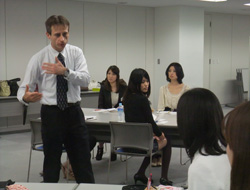|
March 12, 2012
Communication skills are keys to success in business
STEPHEN MCCLURE
Special to The Japan Times

Andrew Jones
What's the secret to success in business? Some might say it's entrepreneurial drive or being a visionary with the practical skills to turn dreams into reality. Having a superior product or service is obviously also a crucial element in making a business succeed.
While all those factors are undoubtedly important, having excellent communication skills is the real secret to making a company agile and nimble enough to stand the test of time, and last long enough to span several generations and even eras.
That's according to Andrew Jones, senior vice president of Prime Communications. Jones says that while a company may offer excellent products and services, the ability to sell them and effectively communicate with the company's target market is absolutely vital.
A soft-spoken Welshman who has lived and worked in Japan for many years, Jones proved himself to be an effective communicator as he outlined Prime Communications' business philosophy in a recent interview at the company's Tokyo office.
"We extend the communications aspect of a company," said Jones, who has an extensive background in the recruitment industry and in-house training programs for corporate clients. "We try to target companies that want to grow and want to empower employees and the people around them."
Prime Communications says that its training programs make people with responsibility over others become more effective leaders. Likewise, those with responsibility for processes in a company become more effective managers. And those with responsibility for selling a company's products and services become more effective salespeople.
Prime Communications doesn't use a dry, academic-style approach. Instead, it believes that hands-on, practical training achieves the best and most long-lasting results. The company helps its clients develop effective communications skills through what Jones describes as experiential-based training, focusing on four key areas: presentation, meetings, negotiations and leadership.
"Our main target is corporations," Jones said, explaining that Prime Communications' clients include both Japanese and foreign-owned companies doing business in Japan. "There's quite a broad need for developing communications skills among manufacturers, banks and many other types of companies.
"We also target hospitals," Jones added. "They also realize that they need to hone their leadership skills. Doctors have many professional relationships, with staff, patients and other doctors."
Jones said there is strong demand for Prime Communications' training services not only from Tokyo-based organizations but also from those located in other parts of Japan.
"The need for communications training can come from any department of a company, but mostly frontline people," Jones noted.
One of the company's more unusual clients is the organization that organizes the annual Miss Nippon competition. Jones explained that contestants are judged not only on their looks, but also in terms of self-presentation and deportment-related skills, such as to walk with poise, and Prime Communications helps them develop those skills.
A typical Prime Communications client is an organization that doesn't have the time or budget to develop its own communications strategy in-house.
"They need a fresh perspective," Jones said.
Prime Communications, which was originally an interpretation, narration, translation, marketing, representation, domestic and international event planning, public relations and bilingual personnel dispatch company, now also teaches people business skills under the umbrella of affiliated company Perfect Speech.
In Jones' eyes, the leadership program is the most important addition to Prime Communications' training programs through its new affiliation.
"Leadership" is a buzzword that's often bandied about without little thought being given to what it actually means. True leaders, Jones said, are not people who lead from the top down in line with the conventional leadership paradigm. Nor is leadership about being "servant leaders" — a term that has gained currency in recent years that refers to leaders who get results for an organization by placing priority on the needs of colleagues and those they serve.
Jones, however, has a slightly different and more focused idea of just what leadership entails.
"A leader in the true sense of the word is a person who can achieve a goal," he said. Another key point of Prime Communications' leadership training programs, Jones added, is that leadership should not be about following what he termed "fashionable trends."
"It's grassroots, practical stuff," Jones stressed.

Jones trains the 2011 Miss Nippon contestants. MISS NIPPON
Another important point about Prime Communications' training programs is that instead of offering clients a one-size-fits-all template, they're tailor-made to meet the needs of an organization.
"Whether there's a training need depends on the company," Jones explained. "We are able to meet the needs of a specific client. We tailor courses to meet needs of each particular client." Training services are provided in English or Japanese as needed.
For example, Jones said, Prime Communications offers a five-week course in interviewing skills to help people handle interviews in a more effective, results-oriented way. The company also offers one-day courses that focus on specific aspects of communications strategy.
"We're able to focus on their skills and hone in on them," Jones explained.
He added that most of Prime Communications' clients come to the company based on recommendations from its past clients.
Prime Communications' training programs include role-playing, experiential training, and public presentation and speech skills.
Jones noted that while in the United States and Canada children are taught "show-and-tell" skills to develop their confidence and presentation abilities, that's not the case here in Japan. And that's where Prime Communications comes in.
"The whole point of what we teach is that these are all learnable skills," Jones noted.
Prime Communications also helps its clients develop the ability to run and take part in meetings effectively.
"People mostly fail at meetings because they don't designate," Jones said.
He said that while the people to whom Prime Communications teaches these skills are of all ages, most are in their 30s or 40s. Jones added that the optimum number of people in a given class is about 10, though the number varies.
"We also have a lot of one-on-one sessions," he added.
Prime Communications prides itself on crafting outside-the-box, innovative training for its clients. For example, Jones said he finds it useful to use poker as a way of teaching how to negotiate effectively.
Emphasizing the company's flexible, case-by-case approach, Jones said that when helping clients develop their speech and presentation skills, he tells them that it can be useful to throw in a few jokes to get the ball rolling.
"If it works for you, it's OK," Jones said.
"What we try not to be are gurus — we don't have all the answers."
He believes that these days there's a strong need in Japan for the kinds of training services Prime Communications provides. Jones noted that while Japan used to be the dominant economic player in Asia, with the rise of India, China and South Korea, "the whole equation has changed."
"All of a sudden Japan has to compete with them," Jones said. "Simply having a good product isn't enough anymore. You have to learn how to sell." Japan, he added, needs to develop the communications skilled required for the next generation of global leaders.
From now on, Jones continued, learning how to integrate new media such as video software into communications strategies is going to be as important as using standard tools such as PowerPoint. And Prime Communications is ready to help its clients use those new tools to get their message across effectively.
|